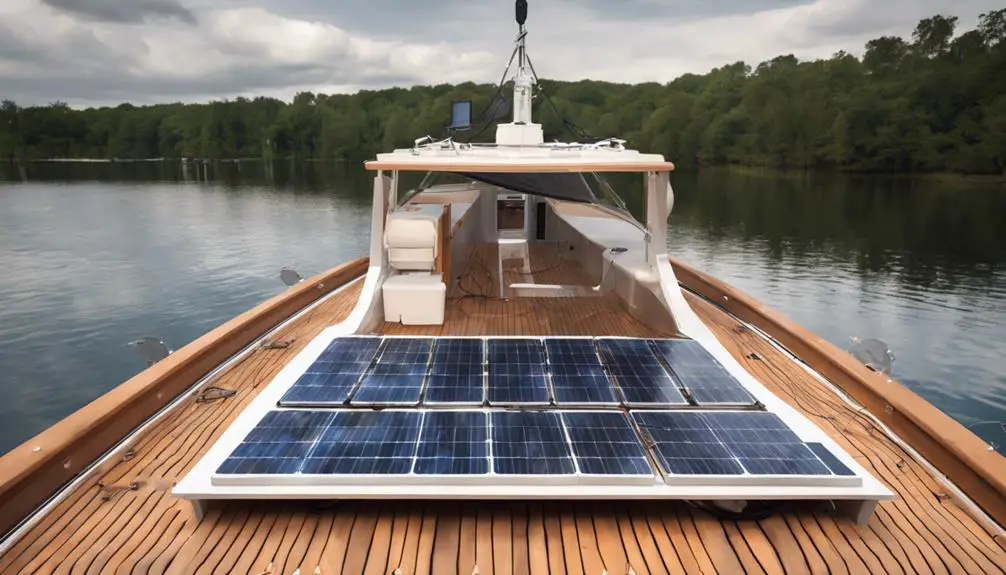When setting up your DIY boat solar panel system, focus on choosing efficient and durable panels suitable for marine use. Prioritize exposure to sunlight for maximum efficiency. Carefully plan the installation process by ensuring safety, space optimization, and weather durability. Securely mount panels and use high-quality cables for wiring. Consider fixed, tiltable, or flexible panels based on your boat's needs. Regularly monitor performance metrics and conduct maintenance checks to keep your system running smoothly. Optimize energy efficiency and contribute to a cleaner marine environment with a well-maintained solar panel system.
Selecting the Right Solar Panels
When selecting the right solar panels for your DIY boat solar panel system, prioritize efficiency over size to maximize power generation within limited space. Panel efficiency is crucial as it determines how much sunlight is converted into electricity. Look for panels with a high efficiency rating to ensure you get the most power output for the space available on your boat. Durability is also key for marine environments; choose panels that are waterproof, corrosion-resistant, and able to withstand harsh weather conditions.
Consider your budget carefully when selecting solar panels. While high-efficiency panels may come at a higher cost initially, they can save you money in the long run by producing more electricity for your boat. Additionally, ensure that the sizing of the panels fits well with the available space on your boat. Measure the area where you plan to install the panels and choose sizes that will fit efficiently without compromising power generation.
Planning the Installation Process
Consider carefully the layout of your boat and the optimal placement of your solar panels to maximize sunlight exposure and efficiency in planning the installation process. Before starting, ensure you have taken all necessary safety precautions. Make sure the panels are securely mounted and all wiring is properly insulated to prevent any accidents.
When planning the layout, prioritize space optimization. Position the panels where they'll receive the most sunlight throughout the day. This won't only increase energy efficiency but also make the most of the available space on your boat.
Additionally, when choosing the placement, consider weather durability. Select areas that are less likely to be affected by harsh weather conditions or potential damage. Ensure that the panels are installed in a way that can withstand strong winds, rain, and saltwater exposure.
Installing Solar Panels on Your Boat
To install solar panels on your boat, begin by securing the necessary mounting hardware and tools for the task. Consider the solar panel efficiency and choose high-quality panels suited for marine environments. Mounting options include fixed, tiltable, or flexible panels, depending on your boat's layout and energy needs. Fixed panels are easy to install and require minimal maintenance, while tiltable panels offer the advantage of maximizing sunlight exposure throughout the day. Flexible panels are lightweight and can conform to curved surfaces.
The benefits of boat solar panels are numerous. They provide a sustainable source of energy, reducing the reliance on fuel-powered generators and decreasing operating costs. Additionally, using solar power contributes to a cleaner marine environment by lowering carbon emissions and minimizing noise pollution. Installing solar panels on your boat isn't only a practical choice but also a step towards a greener and more environmentally friendly boating experience.
Wiring Your Solar Panel System
Begin by carefully planning the wiring layout for your boat solar panel system to ensure efficient energy transfer and optimal performance. When connecting panels, use high-quality cables with proper gauge to minimize power loss.
It's crucial to connect the panels in series or parallel based on your system's voltage requirements. Series connections increase voltage, while parallel connections increase current. Ensure all connections are securely tightened to prevent any voltage drops or overheating issues.
Additionally, establish a proper grounding system to enhance safety and protect your equipment. Grounding helps to prevent electrical shock and reduces the risk of fire hazards. Connect the solar panel frames to the boat's grounding system using grounding wires and appropriate grounding terminals.
Make sure the grounding is done according to marine electrical standards to ensure compliance and safety.
Monitoring and Maintaining Your System
Monitoring and maintaining your boat solar panel system involves regularly checking the performance metrics and conducting routine inspections to ensure optimal functionality.
To maintain system efficiency, it's crucial to monitor the power output regularly. Utilize remote monitoring tools to keep track of the system's performance and identify any deviations promptly. These tools allow you to access real-time data and receive alerts if any issues arise.
Routine maintenance is essential to prolong the lifespan of your solar panel system. Inspect the panels for any signs of damage, such as cracks or corrosion, and clean them regularly to ensure maximum efficiency.
Check the wiring connections for any loose or damaged parts, as these can affect the system's performance. Keep an eye on the battery levels and charge controller to prevent overcharging or undercharging, which can lead to system malfunctions.
In case of any discrepancies, utilize troubleshooting techniques to identify and rectify the problem promptly, ensuring your boat solar panel system operates smoothly.
Conclusion
In conclusion, by following these steps, you can successfully install a DIY boat solar panel system. Remember, 'a stitch in time saves nine' – taking the time to properly plan and install your solar panels will pay off in the long run.
With the right equipment and knowledge, you can harness the power of the sun to keep your boat running efficiently and sustainably.
Happy sailing!
